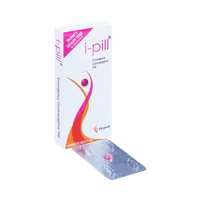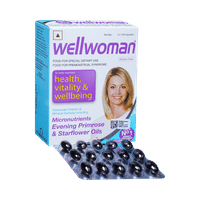Evadhea Tablet

Rs.436for 1 strip(s) (10 tablets each)
food interaction for Evadhea
alcohol interaction for Evadhea
pregnancy interaction for Evadhea
lactation interaction for Evadhea
food
alcohol
pregnancy
lactation
Evadhea Tablet is to be taken with food.
None
None
CAUTION
Caution is advised when consuming alcohol with Evadhea Tablet. Please consult your doctor.
CAUTION
Evadhea Tablet may be unsafe to use during pregnancy. Although there are limited studies in humans, animal studies have shown harmful effects on the developing baby. Your doctor will weigh the benefits and any potential risks before prescribing it to you. Please consult your doctor.
CONSULT YOUR DOCTOR
Evadhea Tablet is probably safe to use during breastfeeding. Limited human data suggests that the drug does not represent any significant risk to the baby.
SAFE IF PRESCRIBED
SALT INFORMATION FOR Evadhea
Dehydroepiandrosterone (Micronized)(75mg)
Uses
Dehydroepiandrosterone (Micronized) is used in the treatment of female infertility.
How it works
Dehydroepiandrosterone (Micronized) is a hormonal medication. It gets converted into sex hormones in the body which are essential for the production and development of healthy eggs. Thus, it helps treat female infertility.
Common side effects
Hair loss, Increased facial sebum production, Acneiform dermatitis, Excessive hair growth on face, Body odor, Premature atrial contractions, Ventricular premature contractions, Mood changes, Hoarseness of voice, Hepatitis (viral infection of liver)
Folic Acid(1mg)
Uses
Folic Acid is used in the treatment of anemia due to folic acid deficiency.
How it works
Folic Acid is a form of vitamin B. It plays a vital role in the formation of red blood cells, which carry oxygen throughout the body. It is also essential in pregnancy due to its role in the development of the unborn baby's brain and spinal cord.
Common side effects
No common side effects seen
Vitamin D3(1000IU)
Uses
Vitamin D3 is used in the treatment of Vitamin D deficiency and osteoporosis.
How it works
Vitamin D3 is a form of vitamin D. It raises vitamin D levels in your blood. This in turn raises calcium levels in your blood by helping you absorb more calcium from food.
Common side effects
Increased calcium in urine, Loss of appetite, Increased calcium level in blood, Itching, Rash, Urticaria, Facial swelling, Genital edema, Dry skin, Nail disorder, Erythematous rash, Decreased prothrombin level in blood, Difficulty in swallowing, Weakness, Fatigue, Sleepiness, Headache, Dryness in mouth, Metallic taste, Nausea, Vomiting
SUBSTITUTES FOR Evadhea
No substitutes foundExpert advice FOR Evadhea
- Dehydroepiandrosterone (Micronized) is used in the treatment of female infertility.
- It can be taken with or without food, but it is better to take it at a fixed time.
- You may experience side effects like acne, hot flashes, and weight gain. Inform your doctor if it bothers you.
- Inform your doctor if have a history of stroke, blood clot, or circulation problems.
Frequently asked questions FOR Evadhea
Dehydroepiandrosterone (Micronized)
Q. Can Dehydroepiandrosterone (Micronized) be taken while I am pregnant?
No, you should not take Dehydroepiandrosterone (Micronized) if you are pregnant or planning to get pregnant. Consult your doctor before taking the medicine as it can affect the fetus in the womb.
Q. Is Dehydroepiandrosterone (Micronized) used in assisted reproduction or patients with infertility?
Yes, Dehydroepiandrosterone (Micronized) can be used in patients of infertility to assist in in vitro fertilization (IVF). It serves as precursors of male and female sex hormones (testosterone and estrogen, respectively). The use of Dehydroepiandrosterone (Micronized) can be helpful in women with diminished ovarian functionality (lower count or quality of the eggs).
Q. Can Dehydroepiandrosterone (Micronized) be used to improve bone strength in osteoporosis?
Dehydroepiandrosterone (Micronized) has been shown to improve bone density and prevent osteoporosis. Hence, it can be useful in cases of osteoporosis, particularly in post-menopausal women. Do not start taking this medication for improving bone health. Contact your doctor first who will evaluate your condition before starting this medication.
Folic Acid
Q. Is it ok to take Folic Acid when not pregnant?
Usually, folic acid requirements are met from the diet and therefore additional supplements are not required. In general, Folic Acid is recommended only when you have a deficiency of folic acid. However, Folic Acid is advised to women who are pregnant and who want to conceive. The medicine should be taken at least 4 weeks before pregnancy and should continue its use up to 3 months of pregnancy. Consult your doctor if not sure.
Q. Can Folic Acid cause weight gain?
Animal studies on Folic Acid suggest that taking the medicine in excess along with a high-fat diet may lead to weight gain and fat accumulation. But this weight gain was not evident when taken along with a normal or low-fat diet, even with excess Folic Acid. In humans, similar studies have not been conducted and therefore knowledge regarding weight gain is lacking. Therefore, if you are on Folic Acid eat a low-fat meal to be on the safer side.
Q. How long does Folic Acid take to work?
Folic Acid usually starts working within a few hours of taking it. If you are taking it for iron deficiency anemia, you may start feeling better after a few weeks of taking it. In case you are taking it during pregnancy, you may not notice any difference but this does not mean that the dose is not working. Continue taking Folic Acid for the duration recommended by your doctor.
Vitamin D3
Q. Is it better to take Vitamin D3 at night or in the morning?
You can take Vitamin D3 at any time of the day, morning, or night. However, there is limited information available about the best time to take Vitamin D3. Take it exactly as advised by your doctor.
Q. What are the benefits of taking Vitamin D3?
Vitamin D3 is important for maintaining bone health, support the health of the immune system, brain, and nervous system. It also regulates insulin levels and is also important for a healthy heart and blood vessels.
Q. How should Vitamin D3 be taken?
Vitamin D3 should be swallowed whole with water and should not be crushed or chewed. It is advised to take it with the main meal of the day to increase its absorption.






















